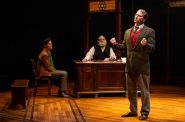Why We Love Cinderella
A new UWM production traces the tale’s history -- and various versions -- going back 30,000 years.
The phrase “Cinderella story” tells us immediately that it’s a narrative about someone in unfortunate circumstance who rises to to unexpected success, just as Cinderella won the glass slipper. But where did the story first come from?
No, it wasn’t first told by the Disney film in the ‘50s, or even by the Brothers Grimm in the 19th century fairy tale. According to UWM theater professor Robin Mello, this story has been retold for millennia, rising (like Cinderella herself) from humble beginnings as a story from pre-literate times that became a fable independently springing up across diverse cultures and told in varying ways. You might say the story of Cinderella is itself a Cinderella Story
Mello will explore that evolution alongside her students in Cinderella: The First 30,000 Years, a theatrical work they’ve developed from scratch. It begins in perhaps one of the most self-aware ways possible for a university production – as the presentation of a doctoral dissertation about the Cinderella myth that gives the audience some historical information and analysis – and quickly transitions into a Brechtian, episodic retelling of five variations on the myth, from ancient Egyptian, Asian, Russian, Germanic and contemporary Disney perspectives.
Each version varies; many are more violent, with Cinderella’s wicked stepmother and stepsisters getting punished or killed for their cruelty to her, and some reward their heroine with boons other than marriage. By giving audiences multiple versions of the story, Mello says, she can both show the ways in which they’re different and the elements that remain the same across cultures. One of the most significant, she believes, is the older stories’ focus on making their Cinderellas responsible for their own transformations, even once they receive help from whatever magical being comes to their aid. Mello says the exception is the pervasive Disney version, which rewards Cinderella simply for being “pretty and sparkly and passive,” a notion she hopes her counter-narratives can subvert.
In doing so, she says, her students have helped guide Cinderella: The First 30,000 Years in a direction she hadn’t intended. While the darkness of Cinderella’s plight is still emphasized, the play finds itself emphasizing her courage and hope. “When all was said and done, they liked the happy endings,” Mello says, “so there’s more of that than I would have put in.”
In doing this, Mello’s had to leave out some elements originally intended for the production – two whole stories have been excised, as have a few political points she’d planned to make. Still, the play does includes allusions to our current global economy, which she says can be described as a “Cinderella economy” where many are enslaved by industry yet ignored by the world at large. But Mello believes the production is stronger for the courage these students have brought to the work, especially since many of them are working on devised theater for the first time in their collegiate career – making this production, in some ways, yet another “Cinderella story.”
Cinderella: The First 30,000 Years runs at Kenilworth Square East (1925 E. Kenilworth Place) Thursdays through Sundays April 25 to May 4, with shows at 7:30 p.m. excepting Sunday matinees at 2:30 p.m. Tickets are $10, $8 for seniors, students and UWM faculty/staff, and $5 for students who order in advance. Order at (414) 229-4308 or the UWM box office.
PREVIEW: 1959 Pink Thunderbird at In Tandem Theatre
You’re not just getting one play in the In Tandem season closer 1959 Pink Thunderbird. The James McClure comedy is two connected one-act plays (Laundry and Bourbon and Lone Star) about residents of a Texas town shortly after the Vietnam War, with one play focusing on three of the town’s women and the other on two of its men. Connecting the two are married couple Roy and Elizabeth; he’s gone off on a bender with his brother and his deteriorating Thunderbird, she’s confiding in her friends that he’s been gone three days and can’t move past his time in Vietnam. In Tandem founders Chris and Jane Flieller take directorial duties on one play each, with Jane directing Laundry and Bourbon and Chris directing Lone Star.
1959 Pink Thunderbird opens April 25 and runs through May 18. Tickets are $25, $23 for students and seniors, and can be purchased at (414) 271-1371 or In Tandem’s box office.
CLOSING THIS WEEK:
Alchemist Theatre: Use No Place Soon, through April 26
Side Street Productions: David’s Redhaired Death, through April 26
Renaissance Theaterworks: Skin Tight, through April 27
Next Act: Three Views of the Same Object, through April 27
Milwaukee Chamber Theatre: Lend Me A Tenor, through April 27
Quasimondo: Bottle 99, through April 27
Theatre Unchained: Company, through April 27
ALSO ON STAGE:
Milwaukee Rep: The History of Invulnerability, Quadracci Powerhouse, through May 4; Ain’t Misbehavin’, Stackner Cabaret, through May 18
Fireside Theater: Fiddler on the Roof (NEW!), through June 8
Theater
-
‘L’Appartement’ Is a Mind-Bending Comedy
 Mar 25th, 2024 by Dominique Paul Noth
Mar 25th, 2024 by Dominique Paul Noth
-
‘The Mountaintop’ Offers Very Human Martin Luther King Jr.
 Mar 11th, 2024 by Dominique Paul Noth
Mar 11th, 2024 by Dominique Paul Noth
-
‘The Chosen’ Is Subtly Powerful Drama
 Mar 10th, 2024 by Dominique Paul Noth
Mar 10th, 2024 by Dominique Paul Noth

















Thanks for the article on Cinderella! I hope to see this production!